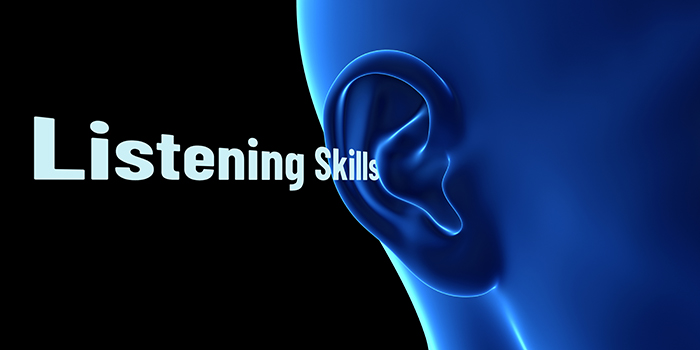 An audiologist once said to a friend of mine, “Your hearing is perfect, but my guess is your listening leaves much to be desired, we can’t test for listening.”
An audiologist once said to a friend of mine, “Your hearing is perfect, but my guess is your listening leaves much to be desired, we can’t test for listening.”
Do you remember when you began to speak, learned to read, or understand a foreign language? All of these required us to first listen. Can you recall when you were taught to listen? Of course not. Listening isn’t in our curriculums or parenting guides. Researchers, Ralph Nichols and Leonard Stevens, who wrote the classic Harvard Business Review article titled, Listening to People, said, “The effectiveness of the spoken word hinges not so much on how people talk but mostly on how they listen.” They tell us that listening ranks number one as a useful communication skill. It is also viewed as the hardest to learn and assess.
The contemporary workplace relies on, and promotes, written communication — text, email, memos. Where, and by whom, are words spoken and who is listening? Zoom and similar platforms have increased speaking and listening. However, only came to extensive use because of a pandemic. Not because people thought they needed more verbal conversations. Written words are currently most people’s preferred method of informing. We all know it has challenges and risks, such as lack of tone, easily appearing blunt, demonstrating poor writing skills, and lacks immediate feedback and attention. We use it for convenience and, at times, to avoid in-person conflict. All of this calls for more verbal communication and better listening skills.
Nichols and Stevens tell us people remember only half of what they hear and most of that they lose almost immediately, no matter how attentive they might be. After two months the retention is down to 25%. Assuming people remember everything that you say is naïve and wrong.
Humans think faster than they speak. It complicates listening. As the listener you are left with time and think space between the words of the person speaking. The question is what do you do with it? Many of us, myself included, use the seconds to handle matters unrelated to the topic at hand. We are planning what we’ll have for lunch, start dreading the next meeting, fantasize about what it would be like to be out of this current situation. You begin to miss what is being said. You start playing mental catch-up, pretending you have hung on to every word. Now you are missing content. You leave the conversation with, maybe, half of what has been said (if you’re lucky). Not good.
How can you handle this conflict between listening and thinking while listening?
- Make a habit of listening. Say to yourself, “listen up!” Catch yourself drifting away or trying to multitask about things unrelated to the conversation.
- Listen for ideas, not just facts. Facts require too much hold space and often do not include ideas. Once you understand the ideas, the facts are easier to process and retain.
- Stay within the conversation, while thinking ahead on the topic.
- Ask clarifying questions. The idea that you should not interrupt the person speaking is not correct — IF you are interrupting for clarification or more information and do it in a respectful way.
- Review and summarize what has been said. Keep your thoughts on the topic at hand.
- Look for unspoken information — the tone, body language, facial expressions. What are these clues telling you?
- Tap into your empathy. Is it currently needed and appropriate? How will you use it and express it?
- Be aware of your emotions. We are more open and ready to hear what is consistent, in keeping with our beliefs and actions (even if they are not true) than listening to opposition, correction, or conflict. Condition yourself to take it all in with equal attentiveness, mindful awareness, and full listening.
- Reserve judgement. Wait until you have heard the entire proposal before concluding or assessing the viability of the ideas. Mindful listening is a way of listening without judgment, criticism, or interruption.
- Stop preparing your comeback. Concentrating on and preparing your debate while a person is speaking, is not good thinking or listening.
- Prove yourself wrong. Rather than spending time listening for the error in logic, poor facts, or unattainable goals of the speaker, search for where you might be wrong while listening to the other perspective.
- Strive to increase and improve your listening. Audit your skills as a listener while you listen to the speaker and think.
Listening is a life and workplace skill that is underrated, unclear, and essential. Most of us have never learned to do it effectively and efficiently. Listen up! Now is the time to start.
Leave a Reply